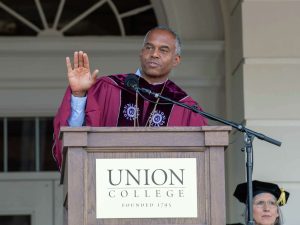Pinion, Schumer debate held at Emerson Auditorium
November 3, 2022
Union College hosted the senatorial debate between incumbent New York senator Chuck Schumer and challenger Joe Pinion. The debate, although closed to the public, was attended by several Union students who were invited by the Political Science Department. The debate was hosted in Union’s Emerson Auditorium in the Taylor Music Center. The debate, which was hosted by Spectrum news, is available for free online. It will be the only debate of the race.
Joe Pinion, the challenger, has previously been a pundit at Newsmax. And he certainly put his skills in the field to the test against Schumer. Schumer, for his part had to do the hard job of defending a record that he alleges is studded with political successes in Washington while New York is also dealing with the lingering effects of COVID-19 and the associated economic dislocation.
The issue of where the focus of the Senator should be was a key issue through the whole debate. Pinion remained critical of Schumer’s failure to improve the conditions of everyday New Yorkers, he specifically mentioned rising crime rates in Yonkers several times, while also several times seeking to avoid answering questions on the ground that they too related to the governance of the state, and therefore not within the purview of the office he was debating for.
Pinion lacked a coherent message for what he should call Schumer’s policies other than simply a failure. Several times, Pinion ridiculed Schumer’s initiatives in Congress as mere band-aids, arguing that they lacked the ability to provide systemic beneficial change for New Yorkers. But in conflict to this, Pinion also attacked many of the more recent initiatives that Congress has passed for being too long term to help New Yorkers. It was a noticeable inconsistency that Schumer failed to capitalize on.
Schumer’s responses to several questions were lackluster. He was canny enough to avoid calling the primary purpose of the Inflation Reduction Act inflation reduction, opting to champion it for the first part of the debate as a measure to combat climate change. But he couldn’t resist, when asked about how he had helped reduce inflation, mentioning the recent passage of the Act. Pinion noticed, and took advantage of it, overshadowing other laws passed under Schumer’s leadership that have had a direct effect on costs, including a price cap on pharmaceuticals.
The debate was characterized by a lack of consensus among the candidates, even on issues where there was no disagreement in the actual content of the answers. When both candidates were asked about the United States’ role in the Paris Climate Accord, the only difference in the answers was Pinion’s insistence that it was a toothless agreement. He had no significant disagreement with the content of the Accord, and neither did Schumer. This part of a larger trend in the debate. When Schumer said “up,” Pinion said “down.” When Schumer said “right.” Pinion said “left.” When Schumer said COVID-19 was a problem, Pinion dissented.
Pinion was the much more energetic debater. He was able to cover a lot more rhetorical ground than his opponent. But while it was rhetorical ground, it was not ideological ground. If Schumer is the status-quo candidate, then this debate did not make clear what kind of candidate Pinion is. Pinion failed to introduce or reiterate any policy position that he was campaigning for. His program, solely from his debate performance, seemed to be to fill in the holes of Schumer’s failures as senator.
But where these holes are, and more importantly how to fix them was unclear. Pinion was critical of the rise in crime in New York, the increased segregation of New York City public schools, and the dilapidated conditions of NYCHA housing. In 42 years combined in the Senate and House of Representatives, there have certainly been many problems in New York while Schumer has been in office. But Pinion did not suggest fixes. The above issues were just as much bludgeons against Schumer as they were real policy issues. And as Pinion himself pointed out when ducking a question about internal New York matters, the federal government and its representatives, including Schumer, can only indirectly influence events in New York State.
As such, passage of any legislation requires compromise and political cajoling in the Senate. And so, it should be unsurprising that Schumer spoke almost exclusively in terms of his accomplishments and failures in the Senate. Schumer rarely spoke in terms of what he planned to accomplish, preferring to speak of what the acts he had helped pass in the Senate would do for New Yorkers in the long term. His failures were not his own, he asserted. Where he had won in the Senate, it was often the result of bipartisanship; when he failed, it was the result of Republican intransigence.
This was an intransigence he tried to associate with Pinion, and often Pinion fell into the trap. Although it should be noted that Pinion attempted to disassociate himself with the Republican Party, clearly denouncing Senator Lindsey Graham’s attempt to criminalize abortion nationally after the Supreme Court struck down Roe v. Wade. Mind you, this was not a pro-abortion stance, but rather an attempt to persuade voters that New York’s existing legal protections were adequate in a post-Roe world.
Pinion’s response to the question of abortion in particular was quaffing. But both candidates had their own times to fudge or attempt to skirt answers. Neither candidate paid particular reverence to the 60 second limit on questions, although Pinion went over time more often than Schumer. The reaction to the debate will ultimately be judged at the polls, as early voting for the senatorial race has already begun, and election day is November 8.
The full debate is available on the Spectrum News website.






